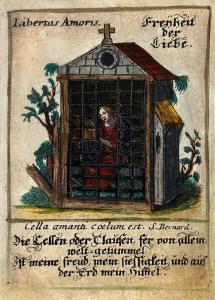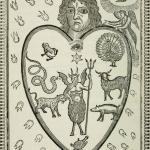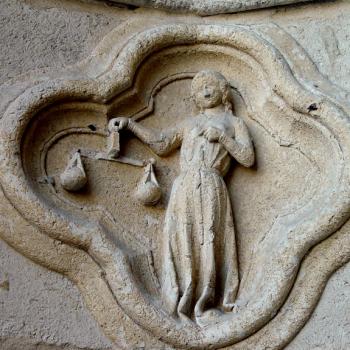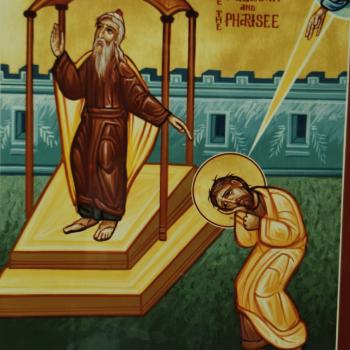
The Apostle Paul, after being freed by grace from the chains of sin and the way it impeded his spiritual development, declared himself to be a prisoner of the Lord. What a strange thing to say! It sounds as if he went from one kind of unfreedom to another. Yes, the Lord is good, and so a far better master than sin, but when Paul says this, it seems to contradict the way he otherwise says Christians are made free in Christ. And yet, as Paul would emphasize in many places, this is exactly the point. Christians truly are set free by Christ; the more they turn themselves over to him, the more they deny themselves (in the proper fashion), the more Christ gives them in return, including their freedom, This is because freedom, true, absolute freedom is had by God, and the more we join ourselves to Christ, the more we become “prisoners” to Christ, the more we find ourselves participating in his freedom, which is the freedom of a divine person. The word choice is striking, but it is meant to be such. It is meant to shock us. It is meant to make us realize how far we must go to turn ourselves from sin. We must die to the self, to the false self we have come to know, the self constructed in and through our sin; to do that, we must bind ourselves to Christ, to let Christ take us in so that in and through him, we can find ourselves coming to spiritual life, receiving our true selves. We must die to the self so we can be resurrected in Christ, and when we are resurrected in Christ, we will find ourselves having true freedom, the kind which we have never known before.
We are to use our newfound true freedom appropriately, that is, to use it to follow the way of Christ, the way of love. The more we do that, the more we will find ourselves obtaining more and more freedom as our personal potential will become greater; on the other hand, if and when we succumb to our old ways, to the way of unlove, we will find our freedom is under threat by those sins and the habits they want to form in us. Thus, Paul exhorted us to lead a life worthy of our calling so that we can continue in and grow in our freedom:
I therefore, a prisoner for the Lord, beg you to lead a life worthy of the calling to which you have been called, with all lowliness and meekness, with patience, forbearing one another in love, eager to maintain the unity of the Spirit in the bond of peace (Eph. 4:1-3 RSV).
The more we follow the way of love, the more we will find ourselves touched by God and God’s love, and through that love, we will find ourselves participating in and experiencing the goodness of the Lord. Love connects us with others. We will find our perfection lies not as individuals cut off from each other, but as persons connected with everyone else. The more we love, the more we grow in freedom, the more we will also find ourselves joining in and connecting with others (and, of course, God), and in doing so, finding our true freedom lies in such a union.
To live our lives worthy of the life which has been given to us, that is, to live the life we have been given in and through Christ, we must strive to continue to grow in love, and through that love, promote Christian unity, the unity we share with those who, like us, have turned themselves over to Christ – that is, with those who have been baptized into Christ and have put on Christ for themselves. The more we do so, the more we will find ourselves partaking of and forming the body of Christ, the Son of the Father. We will see our relationship with the Father comes from our participation in the mystical body of Christ. We will find ourselves drawn to God the Father, and in doing so, see not only how the Father transcends us, but also dwells in and with us (and the whole of creation):
There is one body and one Spirit, just as you were called to the one hope that belongs to your call, one Lord, one faith, one baptism, one God and Father of us all, who is above all and through all and in all (Eph. 4:4-6 RSV).
To live our faith, then, is to connect with others in a bond of love, not only finding ourselves in a participated unity with others, but also participating in Christ’s sonship, becoming in and through him children of God. Love allows for a plurality to be one, while remaining plural, and so, in our connection with each other, in our self-giving to each other out of love, we will also receive ourselves, finding that we are not annihilated but rather enhanced by that unity. We shall live, and thrive, and experience true freedom, in and through our participated unity with each other and with God. We shall be fulfilling the law of God, the law to love, not because it is something we are told to do, but because it is inherent to us; we will love God and our neighbor as ourselves, sharing ourselves eternally with everyone, receiving, in return, everyone with their love, enjoying the beatitude which is to be had in such mutual self-giving love.
Sadly, so long as we have not attained such perfect love, we find ourselves struggling against temptation after temptation, against the habits of sin and unlove, so that we must often be told what love expects of us. Jesus knew this, which is why, when he was questioned about the way of love, he gave the example of the Good Samaritan:
Jesus replied, “A man was going down from Jerusalem to Jericho, and he fell among robbers, who stripped him and beat him, and departed, leaving him half dead. Now by chance a priest was going down that road; and when he saw him he passed by on the other side. So likewise a Levite, when he came to the place and saw him, passed by on the other side. But a Samaritan, as he journeyed, came to where he was; and when he saw him, he had compassion, and went to him and bound up his wounds, pouring on oil and wine; then he set him on his own beast and brought him to an inn, and took care of him. And the next day he took out two denarii and gave them to the innkeeper, saying, `Take care of him; and whatever more you spend, I will repay you when I come back.’ Which of these three, do you think, proved neighbor to the man who fell among the robbers?” He said, “The one who showed mercy on him.” And Jesus said to him, “Go and do likewise” (Lk. 10:30-37 RSV).
While the parable tells us the kind of person we should be, we must also recognize that it also tells us about God, for God is love. It not only tells us what we should do when we see people in need, it show us what God is also doing for all creation, because God is love, and out of that love acts in the way of the Good Samaritan. The calling we have as Christians, the calling which Paul tells us to live out and fulfill, should not be seen some sort of external expectation placed upon us by positive law, some demand God places upon us over and against our nature; rather, it the calling to find ourselves, to become the persons we were meant to be, to be loving like God is loving, knowing true freedom cannot be found without love.
Stay in touch! Like A Little Bit of Nothing on Facebook.
If you liked what you read, please consider sharing it with your friends and family!
N.B.: While I read comments to moderate them, I rarely respond to them. If I don’t respond to your comment directly, don’t assume I am unthankful for it. I appreciate it. But I want readers to feel free to ask questions, and hopefully, dialogue with each other. I have shared what I wanted to say, though some responses will get a brief reply by me, or, if I find it interesting and something I can engage fully, as the foundation for another post. I have had many posts inspired or improved upon thanks to my readers.













